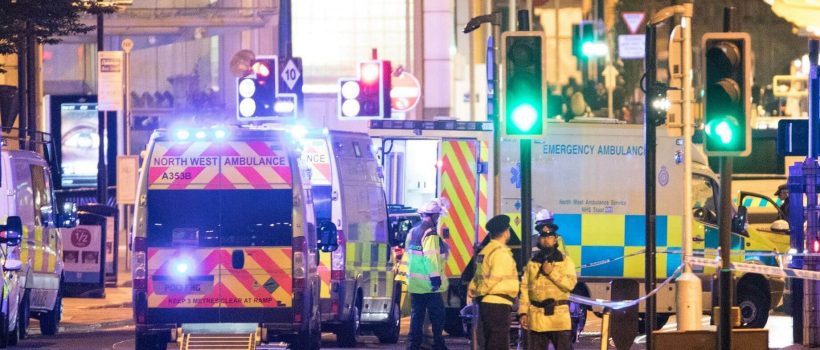The Chief Rabbi reflects on the Manchester Terror Attack

I felt my heart sink deeply as the first reports of yet another devastating terror attack emerged. This time it was children who were mercilessly targeted in Manchester and dozens of families will never be the same again.
Instinctively, one wants to provide words of comfort and reassurance at a time of such trauma and loss. But, what can one say that goes beyond the clichés which are now, tragically, so familiar? Political leaders from around the world send messages of support and condolence. Flags are lowered. Global landmarks are lit up in red, white and blue. The hashtag #PrayersForManchester begins trending on Twitter. Each one is a wonderful, lovely gesture; well-meaning and certainly appreciated by all. And yet, so many of us are left thinking the same thing: of what real value are they?
Prayers? Platitudes? Innocent children have been murdered as they enjoyed a concert with their friends. Could we not do better?
I recall that after a brutal terror attack in France last summer, one social media user responded to a message I wrote: “the time for prayers is long gone”. But, he was wrong and this is why:
If you believe that prayer is little more than words read from a book in Shul, then you have never truly understood its depth and power. The Hebrew word that we use for the act of prayer – ‘Lehitpalell’ – actually means to sit in judgement of oneself. A person at prayer is one who is making a commitment to slowly improve themselves – to make whatever small difference they can, even during times when the challenge before them feels insurmountable.
And was that not precisely the extraordinary reaction of the people of Manchester, in the minutes and hours that followed the attack? Those who happened to be on hand could have reacted with shock and anger. They could have shut themselves off from the world and wept. But they didn’t. Instead, they asked themselves what small difference they might make. In the aftermath of an act of the purest evil, we saw a groundswell of lovingkindness. Hotels offered shelter to those who needed it. Coffee shops provided hot drinks and food for the emergency services. Taxi drivers worked for free. Residents offered up their spare rooms. Queues formed outside blood banks and hundreds of thousands of pounds were raised for the families of the victims.
With these small, individual acts of compassion, every one of these individuals became a hero and their experiences are likely to stay with them forever.
The example that they have set is for us to emulate. Each one of us faces the very same choice that they did. We can react with anger and indignation, we can protest and squabble. Or we can try to find ways in which we can make our own small, positive contribution.
The scourge of global extremism is one of the great challenges of our time and it often feels insurmountable. But, as the American author Mary Mead famously said, we must “never doubt that a small group of thoughtful, committed citizens can change the world – indeed, it is the only thing that ever has.”
So, let us all pray together – not only in word but also in deed. Find the time to do something you have never done before. Take some food to a soup kitchen. Organise an interfaith event. Let the emergency services know how thankful you are for their work. Change something in yourself that will change your world.
Next month, Valerie and I will be hosting an Iftar (the meal eaten by Muslims to break their fast during Ramadan) at our home as part of ‘The Great Get Together’, a national event which will mark the anniversary of the senseless murder of Jo Cox. It will be a gesture of friendship to Muslims who decry violence and who are actively working for peaceful coexistence with people of all faiths and none. I pray that it will empower and embolden them to inspire other Muslims to follow their example and to denounce all violence which is inspired by hate.

